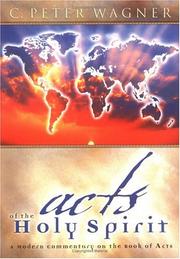Evangelism and the Gift of Missionary (Part 2)
 In Acts of the Holy Spirit (2000), C. Peter Wagner offers an intriguing discussion of the conflict that arose in the Jerusalem church at the beginning of Acts chapter 6. At that time, the church was a mixture of Hebraic Jews, who were natives of Palestine, and Hellenistic Jews from various parts of the Roman Empire. The cultural differences between these groups were significant. Hebraic Jews spoke Aramaic as their first language, whereas Hellenistic Jews spoke Greek. Hebraic Jews were accustomed to living in an all-Jewish society where strict keeping of Jewish law was the social norm. Hellenistic Jews, on the other hand, were accustomed to mingling with Gentiles and were naturally more accommodating of non-Jewish lifestyles.
In Acts of the Holy Spirit (2000), C. Peter Wagner offers an intriguing discussion of the conflict that arose in the Jerusalem church at the beginning of Acts chapter 6. At that time, the church was a mixture of Hebraic Jews, who were natives of Palestine, and Hellenistic Jews from various parts of the Roman Empire. The cultural differences between these groups were significant. Hebraic Jews spoke Aramaic as their first language, whereas Hellenistic Jews spoke Greek. Hebraic Jews were accustomed to living in an all-Jewish society where strict keeping of Jewish law was the social norm. Hellenistic Jews, on the other hand, were accustomed to mingling with Gentiles and were naturally more accommodating of non-Jewish lifestyles.
The tensions between these groups surfaced at the beginning of Acts chapter 6, when Hellenistic Jews pointed out that Hebraic widows were being taken care of by the church, but the Hellenistic widows were not. Acts 6:1 (NIV 2010) reads:
Evangelism and the Gift of Missionary (Part 1)
 Last week, as I was returning from Australia, I began to read Acts of the Holy Spirit by C. Peter Wagner (2000). The author is a former professor of Church Growth at Fuller Theological Seminary, where he served on the faculty for nearly thirty years. (Notable graduates of Fuller include Bill Bright, Rick Warren, John Piper and Rob Bell.)
Last week, as I was returning from Australia, I began to read Acts of the Holy Spirit by C. Peter Wagner (2000). The author is a former professor of Church Growth at Fuller Theological Seminary, where he served on the faculty for nearly thirty years. (Notable graduates of Fuller include Bill Bright, Rick Warren, John Piper and Rob Bell.)
Wagner’s book is a chapter-by-chapter commentary on the book of Acts with two special twists. First, he places strong emphasis on the supernatural gifts of the Holy Spirit, discussing the extent to which these gifts are present in the Church today. Second, he deals extensively with issues of contextualization – the challenges faced by missionaries as they bring the good news of Jesus Christ into human cultures radically different from their own.

Last 30 Comments